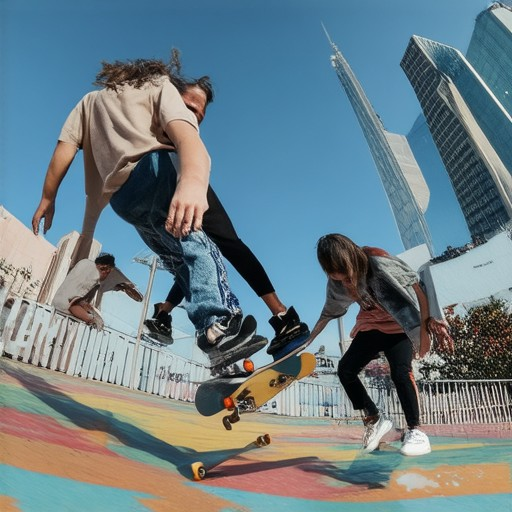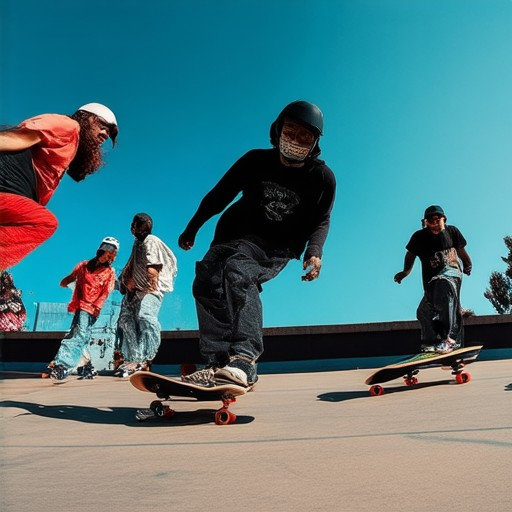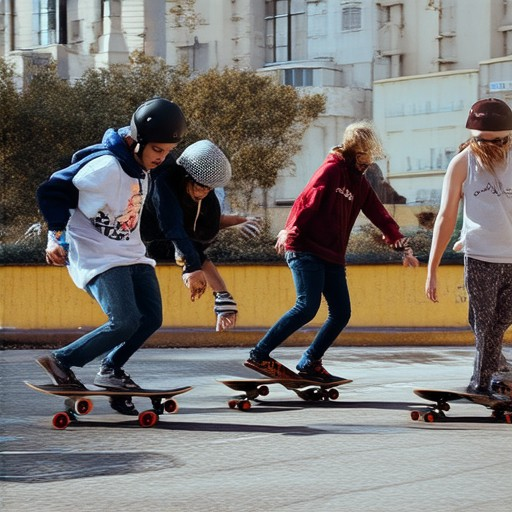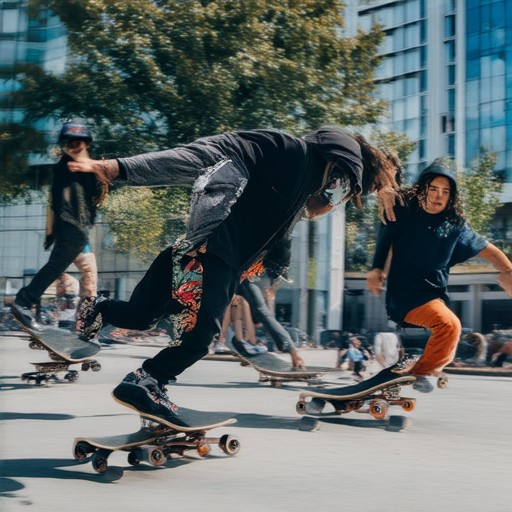Skateboarding culture is more than just a pastime; it’s a vibrant subculture that has shaped lives and redefined urban landscapes worldwide. From its humble beginnings as a grassroots movement to its current status as a globally recognized lifestyle, skateboarding continues to inspire individuals and communities. Whether you’re a seasoned skater or a curious newcomer, the skateboarding lifestyle offers a unique blend of creativity, freedom, and self-expression. This article delves into the core values, historical context, and societal impact of a culture that has transcended generations and borders, becoming a symbol of rebellion, unity, and personal growth.
Key Takeaways
- Skateboarding drives cultural transformation by revitalizing public spaces with urban art and influencing fashion and music.
- It contributes to economic growth, supporting local businesses, generating revenue through sponsorships, and boosting real estate values.
- The sport fosters community building, creating inclusive spaces where individuals connect and collaborate.
- Skateboarding promotes education and empowerment, offering innovative ways to teach and inspire youth.
- It plays a key role in environmental awareness, encouraging eco-friendly practices and enhancing urban landscapes.
- Skateboarding has a global reach, uniting diverse cultures and bridging cultural gaps through shared passion.
- Its media representation elevates its status as a legitimate and influential activity.
- Skateboarding fosters physical fitness and mental well-being, offering a holistic approach to health.
- The lifestyle embodies creativity and self-expression, allowing individuals to thrive and innovate.
- It serves as a force for social change, advocating for inclusivity and preserving skate spots.
- Skateboarding is a global movement that inspires personal growth and societal progress.
- By embracing skateboarding, communities achieve sustainable development and vibrant urban environments.
- Skateboarding stands as a symbol of freedom, creativity, and resilience, shaping lives and cultures worldwide.

What Are the Values of the Skateboarding Subculture?
The skateboarding subculture is rooted in a unique set of values that define its identity and appeal. Below are the core principles that shape this vibrant and dynamic community:
- Freedom: Skateboarding embodies the spirit of freedom. It allows individuals to express themselves creatively and explore new environments, often pushing boundaries and challenging conventions.
- Individualism: The culture celebrates personal style, innovation, and self-expression. Every skateboarder brings a unique perspective and approach to their riding and lifestyle.
- Authenticity: Authenticity is key within the skateboarding community. Riders are judged by their skill and passion rather than external factors like reputation or status.
- Creativity: Skateboarding is a creative outlet, encouraging riders to experiment with tricks, setups, and styles. This fosters a culture of continuous learning and evolution.
- Resilience: The sport requires physical endurance and mental toughness. Skaters often face challenges like learning new tricks or dealing with injuries, building character along the way.
- Community: Skateboarding fosters a sense of belonging among its participants. Local skate parks and events often become hubs where people connect, share experiences, and support each other.
- Exploration: Skateboarding encourages exploration both physically and mentally. Riders are constantly seeking out new spots, whether it’s a hidden park or a new city to ride in.
- Respect for the Environment: Many skaters take pride in preserving the places they skate, advocating for cleaner parks and responsible behavior to protect the local environment.
The skateboarding subculture also emphasizes the importance of sustainability and community engagement. Many initiatives aim to promote eco-friendly practices and support local businesses that contribute to the scene. This shared commitment to these values strengthens the bonds within the skateboarding community and ensures its continued growth and influence.
What Does Skateboarding Symbolize?
Skateboarding transcends mere recreation; it embodies a lifestyle, art form, and cultural expression. Here’s a breakdown of its deeper meanings:
Freedom and Autonomy
Skateboarding symbolizes liberation from conventional constraints. Riders navigate public spaces with unparalleled freedom, defying rules imposed by society. This autonomy often reflects a broader desire for self-expression and rebellion against established norms.
Creativity and Self-Expression
Each trick and move in skateboarding is a creative interpretation, allowing individuals to express themselves uniquely. The board becomes a canvas for innovation, blending physical skill with artistic vision.
Community and Camaraderie
Skateboarding fosters a strong sense of community. Shared experiences at skateparks and events create bonds among participants, fostering mutual respect and camaraderie. Events like competitions and jam sessions highlight collective passion and teamwork.
Resilience and Determination
Learning to skateboard requires persistence and adaptability. Falls and setbacks are inherent parts of the journey, symbolizing the ability to rise after failure and embrace continuous learning.
Challenging Norms and Redefining Boundaries
Skateboarding challenges traditional notions of space and ownership. It redefines urban environments, transforming public areas into dynamic hubs of activity. This defiance of norms aligns with broader cultural shifts toward individuality and creativity.
Mental Health Benefits
Engaging in skateboarding offers mental health benefits, serving as a stress reliever and confidence booster. The flow experienced during tricks mirrors mindfulness practices, providing a unique avenue for introspection and emotional release.
Conclusion
Skateboarding is more than a sport; it’s a reflection of modern life’s complexities. Its dual nature as both a rebellious act and a communal activity makes it a universal symbol of our times, resonating with individuals seeking freedom, creativity, and connection.

The Subculture of Skateboarders
Skateboard culture is a vibrant and dynamic subculture that has evolved over decades, blending art, athleticism, and self-expression. At its core, it’s a community defined by creativity, resilience, and a deep connection to the board and its history.
Key Elements of Skateboard Culture
- Creativity: Skateboarding is a medium for artistic expression, where every trick and style tells a story. From classic ollies to modern grind techniques, each move reflects the rider’s unique perspective.
- Individuality: Skaters often develop a distinct style that sets them apart. Whether it’s their choice of grip tape patterns or the way they approach tricks, individuality is celebrated in this culture.
- Risk-Taking: Pushing boundaries is part of the appeal. Skaters embrace the physical and mental challenges, turning skate parks into laboratories of innovation.
- Community: While skateboarding is an individual sport, it thrives on camaraderie. Local skate parks become hubs where skaters share tricks, offer encouragement, and form lifelong friendships.
The Evolution of Skateboarding
Skateboarding has come a long way since its roots in the 1970s. What started as a simple way to surf the streets has blossomed into a global phenomenon with its own tournaments, fashion trends, and cultural icons.
Modern Skateboarding Trends
- Streetwear Fashion: Skate culture has influenced fashion, with brands creating clothing inspired by the sport’s rebellious spirit. Beanies, hoodies, and cargo pants are staples in many skaters’ wardrobes.
- Technological Advancements: New materials and designs have made skateboards lighter and more durable. Technology like shock absorption systems has improved safety and performance.
- Global Influence: Skateboarding has spread worldwide, with countries like Brazil, Japan, and Sweden developing their own unique styles. This global exchange keeps the culture fresh and evolving.
Ethos and Philosophy
Skateboarders often embody a philosophy of living life fully. The risks involved in skating mirror the uncertainty of everyday life, teaching resilience and adaptability. Many see skateboarding as a metaphor for navigating challenges off the board.
Getting Started
For those new to skateboarding, finding the right setup is crucial. Kickflip Boards offers comprehensive guides on selecting the perfect deck, wheels, and accessories. Their expertise helps riders of all levels enhance their skills and stay connected to the culture.
Join the Community
Kickflip Boards is more than just a resource site; it’s a gateway to a thriving community. Visit their website to explore articles, forums, and video tutorials that will help you master the sport while immersing yourself in its rich history and vibrant culture.
Explore more about skateboarding culture and get tips to improve your skills by visiting Kickflip Boards .

How Has Skateboarding Impacted Society?
Skateboarding has had a profound impact on various aspects of society, shaping culture, economics, and social dynamics. Its influence extends beyond just a sport, touching on creativity, community building, and even urban development.
- Cultural Impact
- Urban Art and Public Spaces: Skateboarding has played a pivotal role in transforming public spaces into vibrant canvases. Skaters often use walls, sidewalks, and abandoned structures as their canvas, creating murals and artistic expressions that inspire others and beautify cities.
- Streetwear Fashion: The skate culture has influenced fashion, with brands and individuals adopting bold, edgy designs inspired by skateboarding attire. This trend has made skateboarding a significant part of modern fashion identity.
- Music and Lifestyle: Skateboarding has also fostered a unique music scene, with many musicians and bands drawn to the skate culture. This connection has led to collaborations between skateboarders and artists, creating a cohesive lifestyle that blends skating, music, and fashion.
- Economic Impact
- Local Businesses: Skate parks and related shops contribute to local economies by attracting visitors and creating jobs. From skateboards and accessories to clothing stores, the demand for skateboarding gear has led to the establishment of numerous businesses worldwide.
- Grants and sponsorships: Many skaters and organizations seek grants and sponsorships to support events, competitions, and community programs. This has turned skateboarding into a revenue-generating activity for many communities.
- Real Estate: In some cities, the presence of skaters and skate parks has increased property values and attracted tourism, further boosting the local economy.
- Social Impact
- Community Building: Skateboarding fosters a sense of belonging among participants. Skate parks and events often serve as gathering spots for people of diverse backgrounds, promoting inclusivity and teamwork.
- Education and Empowerment: Some organizations use skateboarding as a tool for education, offering programs that teach kids math, reading, and problem-solving through skateboarding. This has been particularly effective in underprivileged areas, providing a positive outlet for youth.
- Environmental Awareness: Skateboarding has also contributed to environmental causes. Events and campaigns often incorporate eco-friendly practices, encouraging skaters to take care of their surroundings while enjoying the sport.
- Global Influence
- International Adoption: Skateboarding has become a global phenomenon, with countries like Brazil, Japan, and New Zealand embracing it as a cultural activity. This international appeal has led to the creation of skate parks and events worldwide.
- Xenophile Effect: Skateboarding has helped bridge cultural gaps, with foreign skaters visiting local spots and sharing their own styles. This exchange of ideas has enriched the sport and its associated cultures.
- Media Representation: Skateboarding has gained significant media attention, with major platforms covering events, athletes, and culture. This exposure has increased the visibility and acceptance of skateboarding as a legitimate and influential activity.
Kickflip Boards understands the importance of skateboarding’s impact on society and supports its growth through resources, community engagement, and innovation. Visit our website to explore more about skateboarding culture and how it continues to shape our world: Kickflip Boards .
Skateboarding Lifestyle: Embracing Freedom and Community
The skateboarding lifestyle is more than just riding a board; it’s a unique culture rooted in creativity, community, and a deep connection to the urban environment. Here’s a breakdown of what defines this vibrant subculture:
Community and Camaraderie
At its core, skateboarding thrives on a strong sense of community. Skaters often gather at local skateparks, street spots, and events to share their passion. This shared love for the sport fosters camaraderie, creating a supportive network where everyone feels welcome. Whether it’s encouraging words from peers or collaborative sessions, the community aspect is integral to the lifestyle.
Creativity and Self-Expression
Skateboarding offers a canvas for creativity, allowing individuals to express themselves through tricks, styles, and personal flair. From iconic moves like the ollie to custom graffiti art, every element of skateboarding reflects the rider’s unique style. This freedom of expression allows skaters to push boundaries and explore their artistic potential.
Physical Fitness and Skill Development
While often seen as a recreational activity, skateboarding is also a demanding physical workout. It requires strength, balance, and agility, making it a great way to stay active. Skaters constantly challenge themselves to master new tricks, which not only improves their skills but also builds confidence and discipline.
The Evolution of Skateboarding
From its humble beginnings in beach culture to becoming a global phenomenon, skateboarding has evolved significantly. Today, it encompasses a wide range of styles, including street skating, vertigo, and parkour. This diversity keeps the culture fresh and exciting, attracting a diverse group of enthusiasts.
Sustainable and Artistic Impact
Skateboarding has had a profound impact on urban environments, transforming public spaces into dynamic art pieces. Legal issues and gentrification efforts have led to the loss of some iconic spots, but the culture continues to adapt by finding new places to skate and advocate for public access.
A Global Movement
Skateboarding transcends borders, uniting people from all walks of life. Events like the X Games and the Olympics have brought it to mainstream attention, showcasing its appeal and reach. The lifestyle is now a global movement, with skaters inspiring others to embrace their individuality and take risks.
Equipment and Maintenance
The skateboarding lifestyle also includes the care and maintenance of equipment. From selecting the right board to regular tune-ups, skaters take pride in their setup, ensuring everything performs optimally. Protective gear is essential, whether you’re just starting out or pushing the limits.
Finding Your Niche
Whether you’re a casual rider or a competitive athlete, skateboarding offers something for everyone. Finding your niche within the culture—whether it’s freestyle, technical tricks, or street skating—allows you to connect deeper with the community and develop your own unique style.
Advocacy and Progress
Skateboarding culture is also driven by advocacy efforts. Organizations work to promote inclusivity, improve safety conditions, and preserve skate spots. By supporting these initiatives, skaters contribute to the ongoing development and preservation of their beloved pastime.
Conclusion
The skateboarding lifestyle is a celebration of freedom, creativity, and community. It challenges individuals to push their limits while fostering connections that last a lifetime. Whether you’re hitting the streets or the park, skateboarding offers an unparalleled way to live life to the fullest.

What Are the Social Benefits of Skateboarding?
Skateboarding offers numerous social benefits that extend beyond the physical activity itself. Here are some key advantages:
Mental Health Support
Skateboarding provides a therapeutic outlet for stress relief and emotional expression. Engaging in the sport can reduce anxiety and depression by offering a creative outlet and a sense of accomplishment. The repetitive motions and focus required in skating can also improve concentration and mindfulness.
Fostering Community Connections
Skateboarding naturally brings people together. Whether at skate parks, street spots, or competitions, skaters often share a passion for the culture and collaborate to push boundaries. This shared interest creates strong bonds and a sense of belonging, helping individuals feel part of a larger community.
Physical Fitness and Health
Beyond the obvious physical exercise, skateboarding works multiple muscle groups and improves cardiovascular health. Regular skating can boost endurance, strength, and flexibility, contributing to overall well-being. It’s also a great way to stay active and maintain a healthy lifestyle.
Cultural Richness and Self-Expression
Skateboarding is more than just a sport—it’s a vibrant subculture with its own unique style, music, and fashion. Participants often express themselves through tricks, clothing, and art, fostering individuality and creativity. This cultural aspect allows skaters to connect with others who share similar values and interests.
Teaching Resilience and Perseverance
Learning to skateboard requires persistence and adaptability. Falls and setbacks are inevitable, but they teach individuals to get back up and keep trying. This resilience translates into other areas of life, boosting confidence and problem-solving skills.
Economic Impact and Local Development
Skateboarding parks and events can attract visitors, driving local economies. They also promote public spaces and urban development, turning otherwise underutilized areas into vibrant hubs of activity. This economic boost supports small businesses and community initiatives.
A Path to Personal Growth
Skateboarding challenges riders to constantly improve, whether mastering new tricks or refining existing ones. This continuous learning process fosters a mindset of growth and self-improvement, benefiting personal development and ambition.
A Conclusion on Skateboarding’s Social Benefits
From mental health and community building to physical health and cultural enrichment, skateboarding offers a wealth of social benefits. It serves as a powerful tool for connection, personal empowerment, and societal progress, making it more than just a hobby—it’s a way of life.




0 Comments